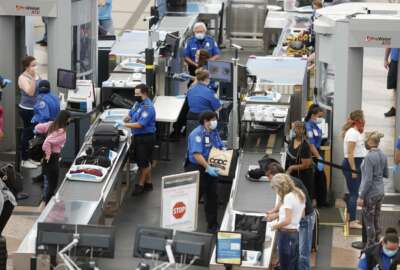The Federal Headlines is a daily compilation of the stories you hear discussed on Federal Drive with Tom Temin.
In today’s Top Federal Headlines, the Defense Department issues a final rule which protects contractors who accidentally sell counterfeit parts from the costs incurred when the fraudulent materials are discovered.
- Contractors who accidentally use counterfeit electronic parts in Pentagon procurements now have a new protection from the costs incurred when the fraudulent materials are discovered. The Defense Department amended the Defense Federal Acquisition Regulation Supplement in a final rule to create a safe harbor for contractors who sold fake parts as long as they have certain measures in place to prevent and detect them. (Federal Register)
- DoD is also giving a break to small businesses and nontraditional defense contractors. It proposed a new rule to implement sections of the National Defense Authorization Act of 2016 which provide exemptions from pricing data and examination requirements to contracts and subcontracts valued under $7.5 million. (Federal Register)
- The Marine Corps has changed the titles of 19 jobs, starting October 1. The new titles will be gender-neutral. They include basic infantry Marine, fire support Marine and light armor vehicle Marine. Training courses Marines take in the future will also be renamed to avoid the word “man” in their titles. (Marine Times)
- The Air Force has a serious shortage of drone pilots. To fill the gap, it’s opening those positions to a broad swath of its enlisted personnel. It’s a significant policy change for an Air Force, that, until last year, had only allowed commissioned officers to operate an airframe of any kind. Officials said Monday that any airman with the rank of staff sergeant or above would be able to test into the program that lets enlisted personnel fly the remotely-piloted Global Hawk. The Air Force only recently opened the program to enlisted personnel that were already working in aviation specialties. The service expects to pick its first round of enlisted pilots in February 2017. (Air Force)
- The Office of Personnel Management gears up for this year’s Open Season with several online services. Beginning Sept. 1, federal employees can enroll in or increase life insurance coverage. They can adjust their health insurance in November. OPM is providing charts, links and answers to questions to help smooth the 2016 Open Season. (Federal News Radio)
- The Equal Employment Opportunity Commission has issued updates to guidance that was approaching 20 years old. Retaliation is the topic of the EEOC’s new enforcement guide. It spells out rules for employers, including federal agencies, in dealing with employees who assert their legal rights. It also updates interference rules under the Americans with Disabilities Act. The guidance was last updated in 1998. The new version has been nearly a year in development. It incorporates several recent supreme court decisions. (Equal Employment Opportunity Commission)
- Some new trains will be added to Amtrak’s Northeast Corridor. The National Railroad Passenger Corporation agrees to buy 28 new high-speed trains from the French company Alstom. Amtrak said demand for its Acela Express service is popular as ever, the new trainsets are set to enter service in 2021. It’s funding the purchase through the Federal Railroad Administration’s Railroad Rehabilitation & Improvement Financing program. (Amtrak)
- For the next 45 days you can get free Wi-Fi at certain stations on D.C.’s MetroRail System. It’s also trying out a real-time rail map for smartphones that will let riders to see where trains are in the system. The stations include Metro Center, Gallery Place, Judiciary Square, Union Station, Archives and L’Enfant Plaza. (WTOP)
- A possible solution for the federal cyber problem: Two cybersecurity leaders offered stunning and depressing words about the state of federal cybersecurity. But Ron Ross of NIST and Bob Bigman, a former CIA chief information security officer, also told the Commission on Enhancing National Cybersecurity that there is a solution. Ross and Bigman said implementing a concept called trustworthy computing would make a huge difference. Bigman said DoD has been using these concepts since 1983. Trustworthy computing entails creating evaluation criteria for networks, supply chain and application security. (Federal News Radio)
Copyright
© 2024 Federal News Network. All rights reserved. This website is not intended for users located within the European Economic Area.





